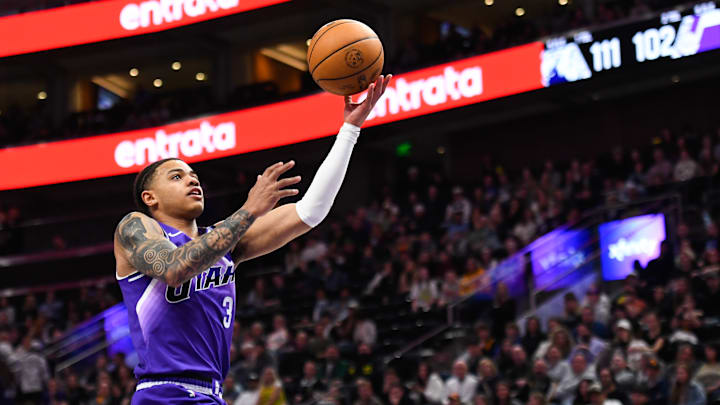Jazz Insider Sounds Off on Fans' Recent Criticism of Rebuild

In this story:
The future is taking shape in year two of the Utah Jazz rebuild. Although they’re multiple players away from contending for a championship, a handful of pieces that could be a part of the future have emerged.
But despite making progress, there have been some worries amongst fans regarding the path in which Utah is currently on. Jazz radio play-by-play announcer David Locke addressed some of the criticism regarding Utah’s rebuild on his podcast Locked on Jazz.
“Blasting the Jazz rebuild right now would be like stopping a movie 15 minutes would be like hiking the Appalachian trail and deciding you don’t like it 15 minutes in," Locke said.
That's an interesting take, and the current roster is certainly not a finished product. However, the way I see it, Locke's analogy is exactly what Utah’s front office has done for two straight years.
Deciding to “stop the movie” and play for draft position/player development AFTER the trade deadline is a rebuilding strategy that's unknown to me. Utah was in striking distance in two straight seasons to make the play-in tournament. Still, it was decided that player development and draft position were more important than winning basketball games and building a positive culture.
The advantages of having a better draft pick and giving the rookies live NBA reps are obvious, but what did Utah gain by changing course? Let's examine.
Draft Position
Utah had a 49% winning percentage at the trade deadline. If they had continued down that path for the remainder of the season, they would have missed the play-in tournament and had the 11th-best lottery odds.
In this scenario, Utah’s top 10 protected first-round selection would have a 90.6% chance of being conveyed to the Oklahoma City Thunder. It’s a debt that, at some point, needs to be paid off.
Without a crystal ball, there's no way of knowing whether it would be better to convey this year or later. Arguments can be made on both sides, so I don't see much of an advantage or disadvantage in retaining their 2023 first-round pick.
Draft Capital
The Jazz did receive some future assets in the deadline deals they made in 2023 and 2024, but they don't amount to much. Last season, the Jazz received the Los Angeles Lakers 2027 first-round pick, but there are some restrictions.
The selection is top-4 protected; if it doesn't convey, it becomes a 2027 second-round pick. The pick does give Utah more ammo to use in a future exchange, but it doesn't move the needle much because of its huge downside.
This season, the Jazz obtained a late first-round pick from the Thunder and an early second-round pick from the Washington Wizards. Kelly Olynyk, Simone Fontecchio, and Ochai Agbaji were the players involved in the exchange.
Since Olynyk and Fontecchio wouldn't be a part of Utah’s future, the trade essentially was Agbaji for a couple of long-shot prospects. I'm unsure if an argument can be made that any advantage was gained.
Player Development
Credit is due to the Jazz front office for the 2023 draft class. Keyonte George, Brice Sensabaugh, and Taylor Hendricks all look like they could be a part of Utah’s rotation moving forward. But if we’re being honest, is getting NBA reps for the last 35% of the season going to change the trajectory of their careers?
George was already getting the reps, while Hendricks and Sensabaugh's development may have slowed down slightly. NBA experience was coming next season, and I believe the pair would have got back up to speed.
Bottom Line
Locke is correct about needing patience with the growing pains that lie ahead, but there is plenty to be frustrated about. If you are going to tank, then do it from day one. By switching gears mid-season, the Jazz gets all of the negatives that come with a tank, but without the high draft picks or some much-needed experience in meaningful late-season basketball.
Next season, the Jazz will start in the same predicament. They’ll have a roster that is too good to tank but not talented enough to be considered a contender. Utah may be caught between a rock and a hard place with tough decisions in front of them.
However, what is clear is that the mixed signals are being sent to the Jazz fan base, and the players aren't working.
Follow Inside The Jazz on Facebook and X.
Subscribe to YouTube for breaking Jazz news videos and live streams!

Patrick Byrnes is the Deputy Editor of The Frozen Rope — SI.com's team website covering the Utah Jazz.
Follow pbyrnesNBA